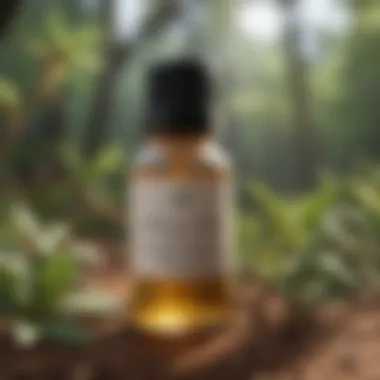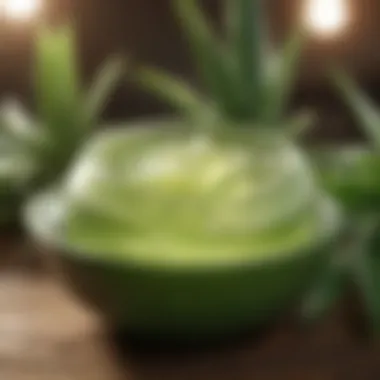Discover Effective Skin Acne Home Remedies for Clearer Skin


Well-Being Overview
Mental Health Matters
In the context of skin health and acne management, mental well-being plays a pivotal role. Understanding the intricate connection between our mental state and skin condition is essential in devising effective remedies. Strategies to enhance mental well-being can include mindfulness practices, stress management techniques, and emotional regulation exercises. By fostering a positive mental outlook, we can alleviate the triggers that contribute to acne development.
Physical Wellness
Optimal physical wellness complements skin health and acne management. Incorporating regular exercise routines tailored to individual needs can improve circulation, detoxification, and overall skin health. Alongside fitness endeavors, adopting healthy eating habits rich in essential nutrients and antioxidants can promote skin healing and regeneration. Prioritizing physical activity ensures not only external benefits but also supports internal mechanisms vital for skin vitality.
Mindfulness & Self-Care Practices
Employing mindfulness techniques can aid in reducing stress levels and promoting skin clarity. Practices such as meditation, deep breathing exercises, and gratitude journaling can enhance resilience against acne triggers. Investing time in self-care rituals, whether through skincare regimes, leisure activities, or relaxation techniques, fosters a balanced approach to well-being. Finding harmony between work responsibilities and moments of relaxation is key in sustaining skin health and managing acne effectively.
Nutrition for Nourishment
Nutrition serves as a cornerstone in skin health and acne prevention. A balanced diet comprising nutrient-rich foods such as leafy greens, colorful vegetables, lean proteins, and healthy fats can support skin rejuvenation and resilience. Incorporating antioxidant-filled foods like berries, nuts, and seeds in daily meals can combat oxidative stress and inflammation linked to acne flare-ups. Experimenting with easy and healthy recipes offers a practical means of integrating skin-friendly nutrients into one's dietary regime.
Understanding Acne
Types of Acne
Types of acne vary from mild to severe forms, including whiteheads, blackheads, papules, pustules, nodules, and cysts. Each type presents differently on the skin and may require distinct treatment approaches. Whiteheads and blackheads are non-inflammatory types, while papules, pustules, nodules, and cysts involve inflammation and can be more challenging to manage. Recognizing the specific type of acne is essential for implementing targeted remedies and achieving clearer skin.


Causes of Acne
Acne can be triggered by various factors, including excess oil production, clogged pores, bacteria, inflammation, and hormonal fluctuations. Genetic predisposition, stress, diet, and certain medications can also contribute to the development of acne. Understanding the root causes of acne is fundamental in tailoring a holistic treatment strategy that addresses the underlying issues rather than just the superficial symptoms. By targeting the causes, it is possible to prevent future breakouts and promote long-term skin health.
Impact of Diet and Lifestyle
The impact of diet and lifestyle choices on acne cannot be overstated. Consuming a balanced diet rich in antioxidants, vitamins, and minerals can support skin health and reduce inflammation. Additionally, avoiding trigger foods high in sugars, trans fats, and dairy products can help minimize acne flare-ups. Lifestyle factors such as stress management, adequate sleep, and regular exercise play a significant role in skin health. By making prudent dietary and lifestyle modifications, individuals can positively influence their skin condition and overall well-being.
Natural Remedies
Natural remedies play a vital role in addressing skin acne in this comprehensive guide. These remedies offer a holistic approach to skin care, harnessing the power of natural ingredients to combat acne symptoms effectively. One of the primary benefits of natural remedies is their gentle nature, which reduces the likelihood of harsh side effects commonly associated with conventional acne treatments. Individuals exploring natural remedies also have the advantage of incorporating ingredients with known skin-clearing properties, promoting healthier and clearer skin.
Tea Tree Oil
Tea Tree Oil is a popular natural remedy renowned for its potent anti-inflammatory and antimicrobial properties. When applied topically, Tea Tree Oil helps reduce acne inflammation and combat acne-causing bacteria on the skin's surface. Additionally, Tea Tree Oil can help regulate sebum production, a key factor in acne development. When using Tea Tree Oil, it is crucial to dilute it properly to prevent skin irritation, as its high concentration can sometimes cause sensitivity issues.
Honey and Cinnamon Mask
The combination of Honey and Cinnamon creates a powerful anti-acne mask due to their antibacterial and anti-inflammatory properties. Honey's moisturizing properties help nourish the skin, while Cinnamon's antimicrobial effects target acne-causing bacteria. Together, they form a potent treatment that can soothe acne-prone skin and promote healing. When preparing the mask, ensure the ingredients are mixed thoroughly to achieve a smooth consistency for easy application.
Apple Cider Vinegar Toner
Apple Cider Vinegar serves as a natural toner that helps balance the skin's pH levels and control excess oil production. Its acidic nature aids in exfoliating the skin gently, removing dead skin cells that can clog pores and contribute to acne formation. Regular use of Apple Cider Vinegar toner can help clarify the skin, tighten pores, and reduce the severity of acne breakouts. However, it is essential to dilute Apple Cider Vinegar with water before application to prevent skin irritation.
Aloe Vera Gel Application


Aloe Vera Gel offers exceptional soothing and healing properties, making it a valuable natural remedy for acne-prone skin. Besides its anti-inflammatory effects that reduce redness and swelling associated with acne, Aloe Vera Gel also helps hydrate and rejuvenate the skin. When applying Aloe Vera Gel, opt for pure and organic formulations to ensure maximum benefits without any added chemicals or preservatives.
Herbal Solutions
Licorice Root Extract
Licorice root extract is a standout ingredient in herbal acne solutions due to its potent anti-inflammatory and skin-soothing properties. This natural remedy helps reduce redness and inflammation associated with acne, promoting a calmer complexion. Licorice root contains compounds that inhibit the growth of acne-causing bacteria, making it an effective ally in treating blemishes and breakouts. Regular use of licorice root extract can contribute to overall skin clarity and radiance, making it a go-to option for individuals seeking a gentle yet powerful solution for acne-prone skin. When selecting licorice root products, opt for high-quality formulations to ensure maximum benefits for your skin.
Neem Leaf Paste
Neem leaf paste is a time-honored remedy in Ayurvedic tradition, valued for its antibacterial and antimicrobial properties. This herbal paste is renowned for its ability to combat acne-causing bacteria, reduce inflammation, and promote wound healing, making it a versatile solution for skin concerns. Neem's natural astringent properties help tighten pores and regulate sebum production, essential for managing oily and acne-prone skin. Incorporating neem leaf paste into your skincare routine can help alleviate acne symptoms and nurture healthier skin over time. Consider exploring formulations that contain pure neem extracts to experience the full benefits of this potent herbal remedy.
Diet Modifications
When delving into diet modifications, the incorporation of omega-3 fatty acids emerges as a standout component. Omega-3 fatty acids are renowned for their anti-inflammatory properties, which can help mitigate the inflammatory response associated with acne breakouts. Sources rich in omega-3 fatty acids include fatty fish like salmon, walnuts, and chia seeds. By seamlessly integrating these sources into one's diet, individuals may witness a reduction in the severity and frequency of acne flare-ups.
Furthermore, reducing dairy consumption stands out as a strategic maneuver in combating acne from within. Studies have indicated that dairy products, particularly those high in skim milk, may exacerbate acne due to their influence on insulin levels and hormonal imbalances. By curtailing dairy intake, individuals can potentially alleviate acne symptoms and support clearer skin.
Equally paramount in diet modifications is the emphasis on increasing water intake. Staying adequately hydrated not only promotes overall health but also plays a pivotal role in skin hydration and detoxification. By enhancing water intake, individuals can help flush out toxins, regulate oil production, and maintain skin elasticity. This simple yet profound adjustment can significantly impact skin health and contribute to acne management.
In summation, the intricate interplay between diet and acne underscores the significance of diet modifications in fostering optimal skin health. From omega-3 fatty acids to dairy reduction and heightened water consumption, each dietary adjustment holds the potential to recalibrate the internal environment, ushering in a clearer, more radiant complexion.
Lifestyle Adjustments
In the realm of combating acne, the significance of lifestyle adjustments cannot be overlooked. Lifestyle factors such as diet, exercise, stress management, and sleep patterns play a pivotal role in the overall health of the skin. Adopting a holistic approach that includes lifestyle modifications can greatly impact the frequency and severity of acne breakouts. By integrating healthy habits into daily routines, individuals can support their skin's natural balance and enhance its resilience against acne-causing factors. It is essential to understand that skincare is not solely about external treatments but also about nurturing the body from within.


Regular Exercise Routine
Embedding a regular exercise routine into one's lifestyle is an underrated yet potent tool in the fight against acne. Exercise promotes circulation, which helps deliver oxygen and nutrients to the skin, aiding in its rejuvenation and repair processes. Additionally, physical activity induces sweat, which flushes out toxins from the body and cleanses the skin from within. Engaging in activities like jogging, yoga, or strength training not only benefits the body's overall well-being but also contributes to clearer and healthier skin. However, care must be taken to cleanse the skin post-workout to prevent sweat-induced breakouts.
Stress Management Techniques
In today's fast-paced world, stress has become a common denominator in various health issues, including acne. Stress triggers hormonal imbalances that can exacerbate acne symptoms. Therefore, incorporating effective stress management techniques is vital for skin health. Practices such as mindfulness meditation, deep breathing exercises, yoga, and engaging in hobbies can help reduce stress levels and promote a sense of calm. By including these strategies in daily routines, individuals can better manage stressors, mitigate its impact on skin health, and pave the way for clearer, more radiant skin.
Medical Procedures for Acne
When it comes to addressing severe or treatment-resistant acne, medical procedures emerge as advanced interventions that can deliver remarkable results in acne management. Medical procedures for acne are typically performed in clinical settings under the supervision of dermatologists or trained skincare professionals. These procedures encompass a wide range of techniques aimed at targeting stubborn acne lesions, reducing inflammation, and improving overall skin texture and appearance.
One of the most common medical procedures for acne is microneedling, a minimally invasive technique that involves creating controlled micro-injuries in the skin to stimulate collagen production and enhance the absorption of topical medications. Microneedling can help improve acne scarring, reduce hyperpigmentation, and promote overall skin rejuvenation for a more even complexion.
Another popular medical procedure for acne is laser therapy, which utilizes focused laser beams to target and destroy acne-causing bacteria, reduce sebum production, and minimize inflammation. Laser therapy can be effective in treating moderate to severe acne, promoting clearer skin with fewer breakouts over time. Additionally, laser treatments may help in improving skin tone and texture, addressing concerns beyond acne lesions.
Chemical peels are also commonly used as medical procedures for acne management. By applying a solution containing exfoliating agents to the skin, chemical peels help remove dead skin cells, unclog pores, and promote skin renewal. Chemical peels can aid in reducing acne lesions, controlling oil production, and enhancing the overall radiance of the skin.
Before undergoing any medical procedure for acne, it is essential to consult with a qualified dermatologist to determine the most suitable treatment option based on individual needs and skin condition. Since medical procedures may have varying degrees of invasiveness and downtime, understanding the potential risks and benefits is critical in making informed decisions about acne treatment strategies.
Conclusion
Comprehensively, a holistic approach serves as a beacon of hope for those battling acne, offering a sustainable path towards achieving clear and radiant skin. By emphasizing the interconnectedness of physical, mental, and emotional well-being, individuals can cultivate a harmonious environment that supports overall skin health. The amalgamation of natural remedies, herbal solutions, dietary alterations, and mindfulness practices culminates in a synergistic approach that not only targets existing acne but also prevents future breakouts. Thus, the conclusion underscores the necessity of adopting a holistic perspective towards skincare, underscoring the transformative power of a comprehensive regimen in achieving long-lasting results.
Embracing a Holistic Approach
Delving into the intricacies of embracing a holistic approach towards treating acne unveils a multifaceted strategy that transcends conventional skincare techniques. At its core, a holistic approach signifies a paradigm shift in viewing acne as a reflection of internal harmony or discord within the body. By holistically addressing the root causes of acne, individuals can cultivate sustainable solutions that yield profound results. Integrating natural remedies enriched with anti-inflammatory and antibacterial properties leverages the healing potential of nature to soothe and rejuvenate the skin.
Moreover, incorporating herbal solutions like licorice root extract and neem leaf paste harnesses the power of botanical ingredients renowned for their therapeutic properties. These herbal elixirs not only combat acne-causing bacteria but also nourish the skin, restoring its natural balance and vitality. Dietary modifications play a pivotal role in a holistic approach, emphasizing the significance of omega-3 fatty acids, hydration through increased water intake, and the reduction of dairy products known to exacerbate acne.
Furthermore, lifestyle adjustments such as regular exercise routines and stress management techniques contribute to overall well-being, fostering a harmonious environment conducive to skin health. By embracing a holistic approach grounded in natural remedies, herbal solutions, dietary tweaks, and lifestyle enhancements, individuals can embark on a transformative journey towards clearer, healthier skin - redefining skincare not as a mere surface-level concern but as a holistic practice that nurtures the body, mind, and soul.



